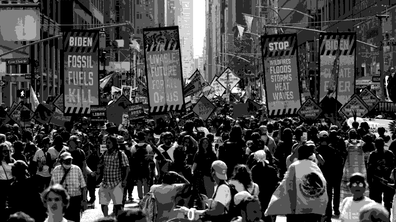
Mixing politics and business can’t be two things at once… unless you’re a cultural absolutist.
The millions of dollars that major companies spend on lobbyists — intent on swaying legislators and regulators to pass laws and make decisions that are favorable to business — is considered normal. Every firm from coal mining to crypto mining spends vast sums on influencing Washington, state capitals, and city halls.
Yet when corporations take a stand on social, religious, gender, and racial issues or speak out about armed aggression, someone will issue a call for a protest or boycott. It could be a customer or a senator, an organization or a sect. It will definitely be someone who’s convinced that “I’m right, and you’re not.”
THE NEW ABNORMAL
This enters the netherworld of the high court’s Citizens United and McCutcheon decisions. As misguided as those rulings may be, they established the idea that a corporation is a person and has the same speech rights as an individual.
When companies are spending money on PACs or ballot initiatives, some consider it fair play, others interference, but voters, ultimately, are influenced by those efforts. They’re not always accurately informed, but they don’t seem to care… as long as the cause fits their preconceived perceptions and assures them that they won’t be inconvenienced.
However, in the court of cultural conflict, passions flare. Speak up for just about anything that’s thought of as liberal, and voices will shout about wokeness (even though they misrepresent what “woke” really means). Support a conservative issue, and the culture warriors attack, claiming bias against a minority and, these days, implicitly in favor of white-is-right.
YES OR NO, NOT MAYBE
If anyone attempts to strike a balance — to recognize legitimate merits about conflicting points of view — the partisans reject them. Though human behavior reflects an infinite number of shades of gray, not black and white, it’s got to be us vs. them, the good against the bad, the right against the wrong. If someone is for this, they must be against that.
Nothing’s that simple. Unfortunately, politicians will say it is if saying so will earn people’s votes. Corporations will shy away from controversy for fear of losing Wall Street’s or buyers’ support (and the impact on share price and revenue).
AN OUNCE OF PREVENTION OR EXPOUND THE IMPURE?
Speaking out is not merely brave. It’s essential. Silence gives comfort to demagogues and despots-in-waiting. Or, depending on your viewpoint, to libertines and blasphemers.
If Browning was right to say, “God’s in his heaven, all’s right with the world,” where is God when the world is in turmoil? What makes religious principles right when their adherents defend people whose lives violate those foundational tenets?
Gen Z wants to work for and buy from companies that reflect their goals for career growth, diversity, low or positive impact on the climate, mental health awareness, and economic prosperity. Their parents and grandparents tend to favor the status quo, even if it will have a negative effect on all those concerns.
THE WEIGHTING GAME
Clean energy or fossil fuels? Green careers or outdated ones? Artificial intelligence or only human? A safer tomorrow or a more convenient today? Those are choices that psychologists adore. Do you want one marshmallow now or three in an hour from now? The long-term studies show that those who defer gratification do better in their careers and their lives.
What choice will you make?
The millions of dollars that major companies spend on lobbyists — intent on swaying legislators and regulators to pass laws and make decisions that are favorable to business — is considered normal. Every firm from coal mining to crypto mining spends vast sums on influencing Washington, state capitals, and city halls.
Yet when corporations take a stand on social, religious, gender, and racial issues or speak out about armed aggression, someone will issue a call for a protest or boycott. It could be a customer or a senator, an organization or a sect. It will definitely be someone who’s convinced that “I’m right, and you’re not.”
THE NEW ABNORMAL
This enters the netherworld of the high court’s Citizens United and McCutcheon decisions. As misguided as those rulings may be, they established the idea that a corporation is a person and has the same speech rights as an individual.
When companies are spending money on PACs or ballot initiatives, some consider it fair play, others interference, but voters, ultimately, are influenced by those efforts. They’re not always accurately informed, but they don’t seem to care… as long as the cause fits their preconceived perceptions and assures them that they won’t be inconvenienced.
However, in the court of cultural conflict, passions flare. Speak up for just about anything that’s thought of as liberal, and voices will shout about wokeness (even though they misrepresent what “woke” really means). Support a conservative issue, and the culture warriors attack, claiming bias against a minority and, these days, implicitly in favor of white-is-right.
YES OR NO, NOT MAYBE
If anyone attempts to strike a balance — to recognize legitimate merits about conflicting points of view — the partisans reject them. Though human behavior reflects an infinite number of shades of gray, not black and white, it’s got to be us vs. them, the good against the bad, the right against the wrong. If someone is for this, they must be against that.
Nothing’s that simple. Unfortunately, politicians will say it is if saying so will earn people’s votes. Corporations will shy away from controversy for fear of losing Wall Street’s or buyers’ support (and the impact on share price and revenue).
AN OUNCE OF PREVENTION OR EXPOUND THE IMPURE?
Speaking out is not merely brave. It’s essential. Silence gives comfort to demagogues and despots-in-waiting. Or, depending on your viewpoint, to libertines and blasphemers.
If Browning was right to say, “God’s in his heaven, all’s right with the world,” where is God when the world is in turmoil? What makes religious principles right when their adherents defend people whose lives violate those foundational tenets?
Gen Z wants to work for and buy from companies that reflect their goals for career growth, diversity, low or positive impact on the climate, mental health awareness, and economic prosperity. Their parents and grandparents tend to favor the status quo, even if it will have a negative effect on all those concerns.
THE WEIGHTING GAME
Clean energy or fossil fuels? Green careers or outdated ones? Artificial intelligence or only human? A safer tomorrow or a more convenient today? Those are choices that psychologists adore. Do you want one marshmallow now or three in an hour from now? The long-term studies show that those who defer gratification do better in their careers and their lives.
What choice will you make?


 RSS Feed
RSS Feed